Organizational Behaviour: Unilever's Culture, Motivation, and Teams
VerifiedAdded on 2023/01/04
|17
|3939
|2
Report
AI Summary
This report provides a comprehensive analysis of organizational behaviour within the context of Unilever, a multinational consumer goods company. It begins by examining the influence of organizational culture, power dynamics, and workplace politics on team and individual behaviour and performance, referencing Handy's organizational culture types. The report then delves into motivation theories, evaluating both content theories, such as Maslow's Hierarchy of Needs, and process theories, like Vroom's Expectancy Theory, to understand how they apply to individuals and teams in achieving organizational goals. Furthermore, the report contrasts effective and ineffective team dynamics, outlining characteristics that contribute to successful team performance versus those that hinder it. The content includes illustrations and tables to support the points. The report concludes with an overview of the concepts and philosophies of organizational behaviour within Unilever.
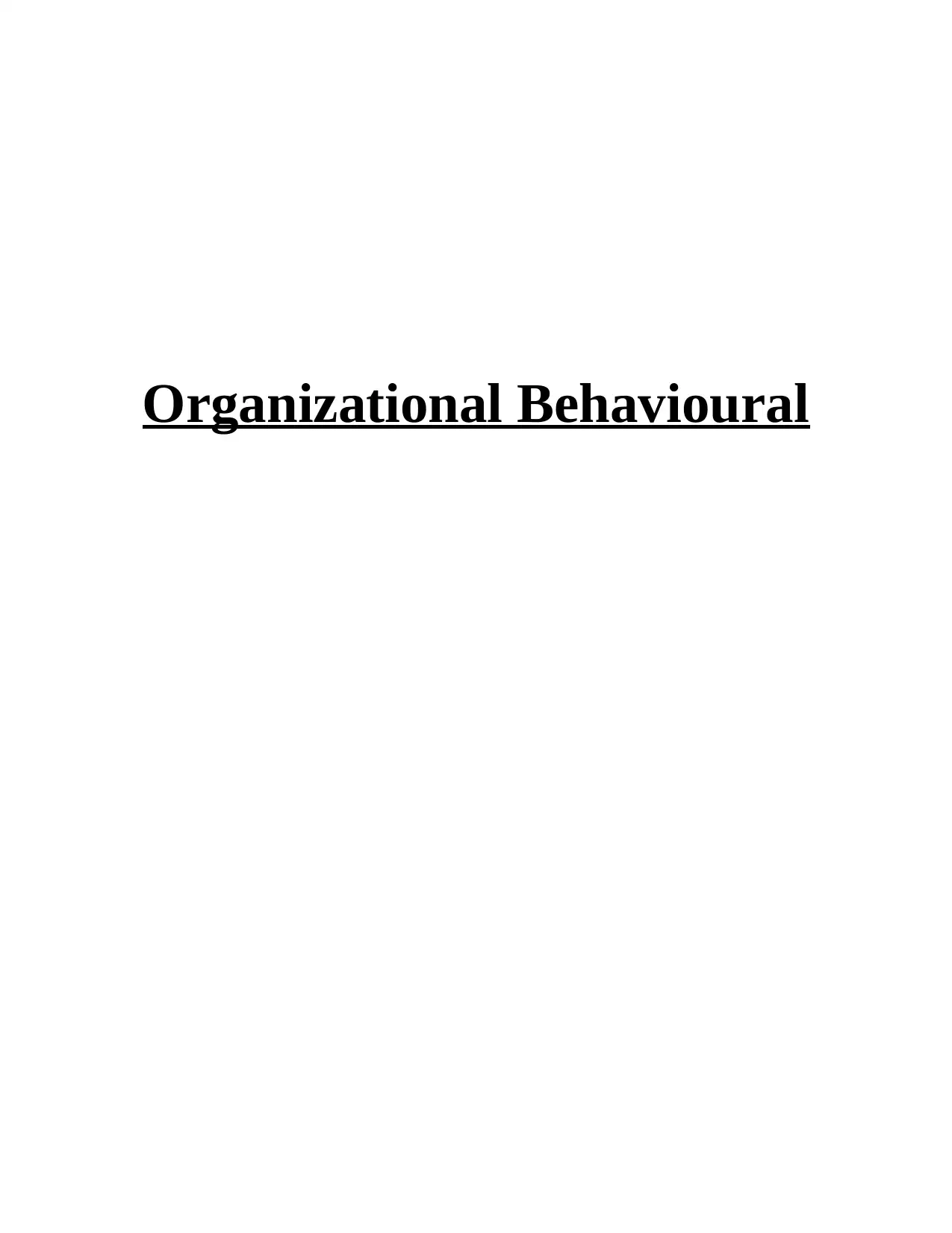
Organizational Behavioural
Paraphrase This Document
Need a fresh take? Get an instant paraphrase of this document with our AI Paraphraser
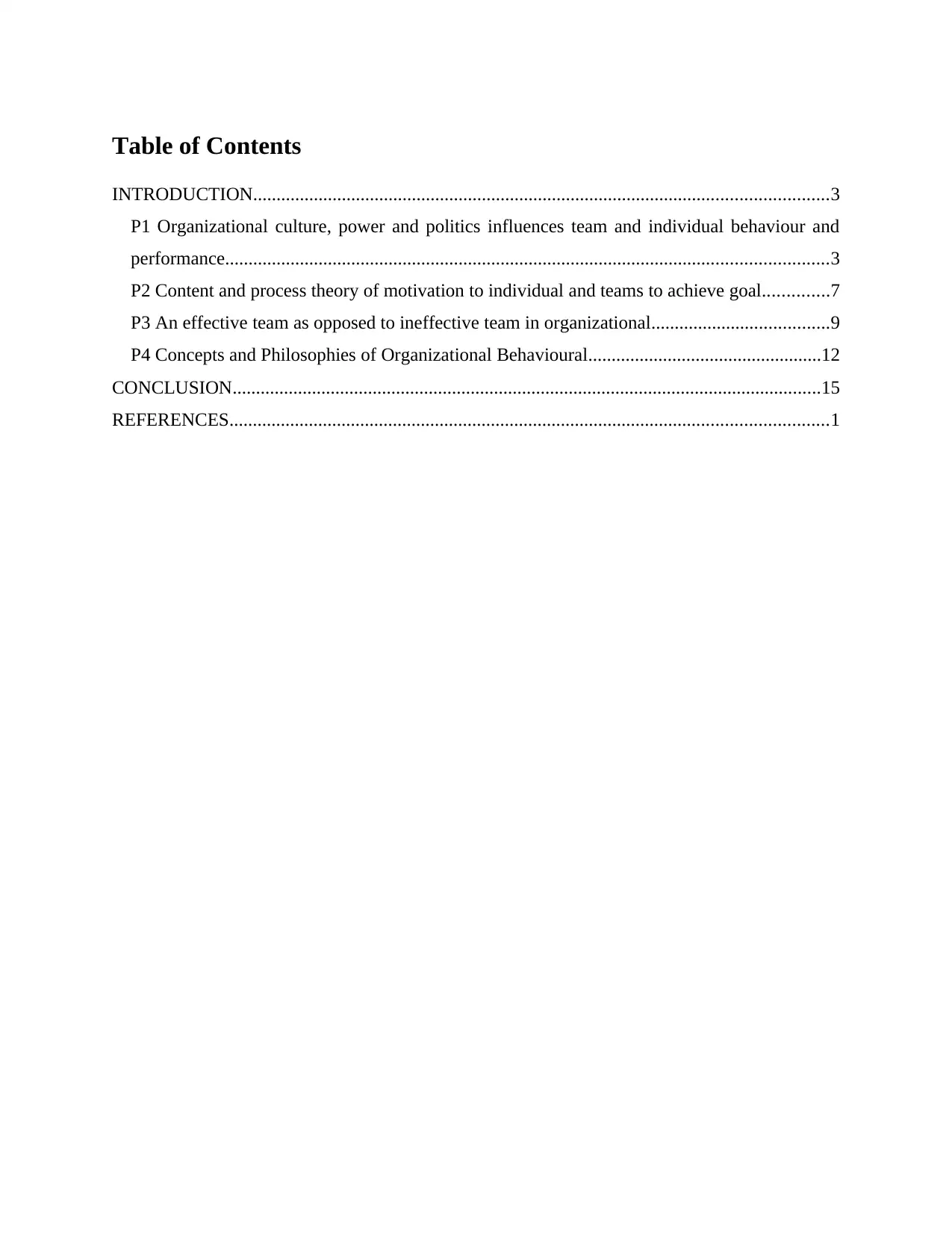
Table of Contents
INTRODUCTION...........................................................................................................................3
P1 Organizational culture, power and politics influences team and individual behaviour and
performance.................................................................................................................................3
P2 Content and process theory of motivation to individual and teams to achieve goal..............7
P3 An effective team as opposed to ineffective team in organizational......................................9
P4 Concepts and Philosophies of Organizational Behavioural..................................................12
CONCLUSION..............................................................................................................................15
REFERENCES................................................................................................................................1
INTRODUCTION...........................................................................................................................3
P1 Organizational culture, power and politics influences team and individual behaviour and
performance.................................................................................................................................3
P2 Content and process theory of motivation to individual and teams to achieve goal..............7
P3 An effective team as opposed to ineffective team in organizational......................................9
P4 Concepts and Philosophies of Organizational Behavioural..................................................12
CONCLUSION..............................................................................................................................15
REFERENCES................................................................................................................................1
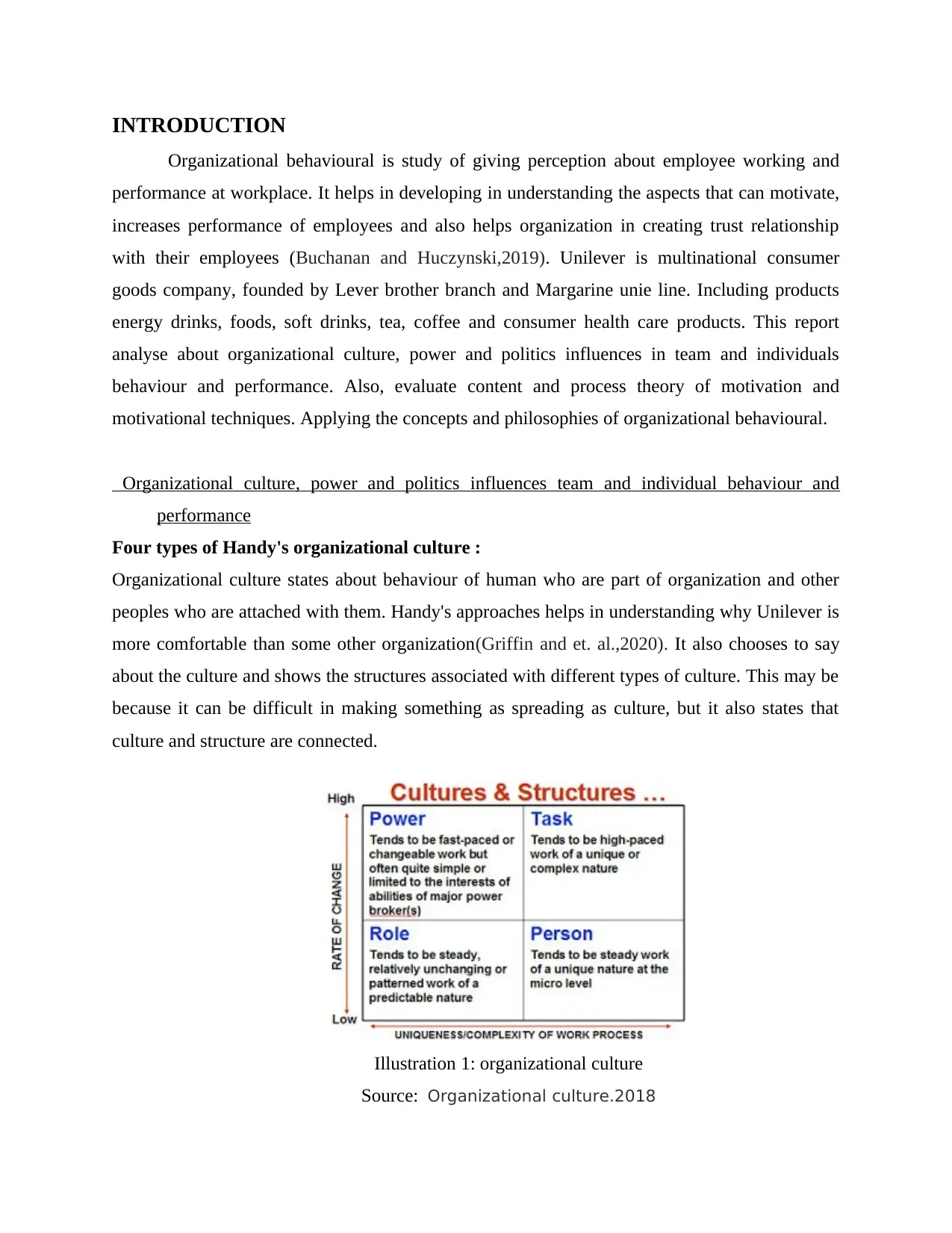
INTRODUCTION
Organizational behavioural is study of giving perception about employee working and
performance at workplace. It helps in developing in understanding the aspects that can motivate,
increases performance of employees and also helps organization in creating trust relationship
with their employees (Buchanan and Huczynski,2019). Unilever is multinational consumer
goods company, founded by Lever brother branch and Margarine unie line. Including products
energy drinks, foods, soft drinks, tea, coffee and consumer health care products. This report
analyse about organizational culture, power and politics influences in team and individuals
behaviour and performance. Also, evaluate content and process theory of motivation and
motivational techniques. Applying the concepts and philosophies of organizational behavioural.
Organizational culture, power and politics influences team and individual behaviour and
performance
Four types of Handy's organizational culture :
Organizational culture states about behaviour of human who are part of organization and other
peoples who are attached with them. Handy's approaches helps in understanding why Unilever is
more comfortable than some other organization(Griffin and et. al.,2020). It also chooses to say
about the culture and shows the structures associated with different types of culture. This may be
because it can be difficult in making something as spreading as culture, but it also states that
culture and structure are connected.
Illustration 1: organizational culture
Source: Organizational culture.2018
Organizational behavioural is study of giving perception about employee working and
performance at workplace. It helps in developing in understanding the aspects that can motivate,
increases performance of employees and also helps organization in creating trust relationship
with their employees (Buchanan and Huczynski,2019). Unilever is multinational consumer
goods company, founded by Lever brother branch and Margarine unie line. Including products
energy drinks, foods, soft drinks, tea, coffee and consumer health care products. This report
analyse about organizational culture, power and politics influences in team and individuals
behaviour and performance. Also, evaluate content and process theory of motivation and
motivational techniques. Applying the concepts and philosophies of organizational behavioural.
Organizational culture, power and politics influences team and individual behaviour and
performance
Four types of Handy's organizational culture :
Organizational culture states about behaviour of human who are part of organization and other
peoples who are attached with them. Handy's approaches helps in understanding why Unilever is
more comfortable than some other organization(Griffin and et. al.,2020). It also chooses to say
about the culture and shows the structures associated with different types of culture. This may be
because it can be difficult in making something as spreading as culture, but it also states that
culture and structure are connected.
Illustration 1: organizational culture
Source: Organizational culture.2018
⊘ This is a preview!⊘
Do you want full access?
Subscribe today to unlock all pages.

Trusted by 1+ million students worldwide
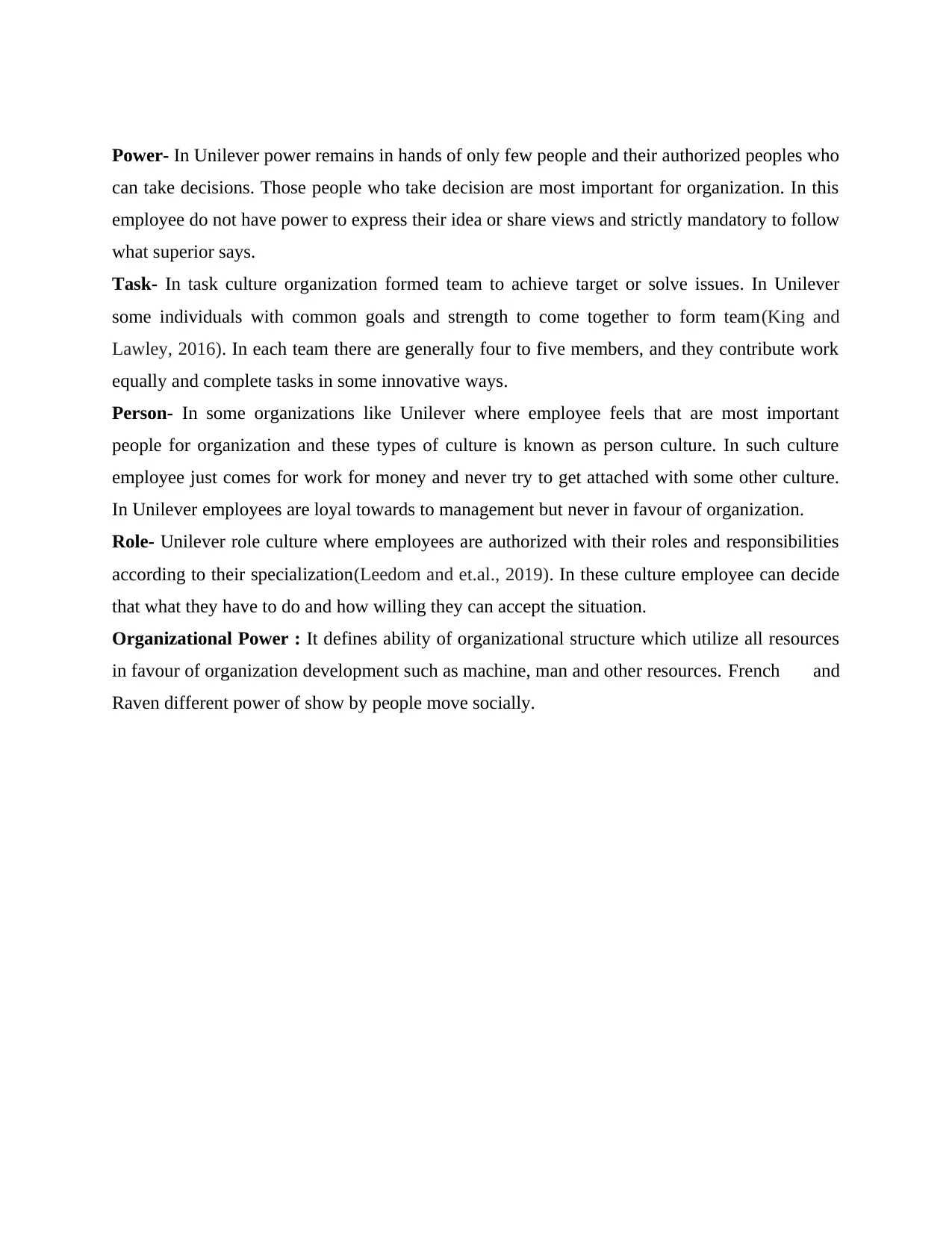
Power- In Unilever power remains in hands of only few people and their authorized peoples who
can take decisions. Those people who take decision are most important for organization. In this
employee do not have power to express their idea or share views and strictly mandatory to follow
what superior says.
Task- In task culture organization formed team to achieve target or solve issues. In Unilever
some individuals with common goals and strength to come together to form team(King and
Lawley, 2016). In each team there are generally four to five members, and they contribute work
equally and complete tasks in some innovative ways.
Person- In some organizations like Unilever where employee feels that are most important
people for organization and these types of culture is known as person culture. In such culture
employee just comes for work for money and never try to get attached with some other culture.
In Unilever employees are loyal towards to management but never in favour of organization.
Role- Unilever role culture where employees are authorized with their roles and responsibilities
according to their specialization(Leedom and et.al., 2019). In these culture employee can decide
that what they have to do and how willing they can accept the situation.
Organizational Power : It defines ability of organizational structure which utilize all resources
in favour of organization development such as machine, man and other resources. French and
Raven different power of show by people move socially.
can take decisions. Those people who take decision are most important for organization. In this
employee do not have power to express their idea or share views and strictly mandatory to follow
what superior says.
Task- In task culture organization formed team to achieve target or solve issues. In Unilever
some individuals with common goals and strength to come together to form team(King and
Lawley, 2016). In each team there are generally four to five members, and they contribute work
equally and complete tasks in some innovative ways.
Person- In some organizations like Unilever where employee feels that are most important
people for organization and these types of culture is known as person culture. In such culture
employee just comes for work for money and never try to get attached with some other culture.
In Unilever employees are loyal towards to management but never in favour of organization.
Role- Unilever role culture where employees are authorized with their roles and responsibilities
according to their specialization(Leedom and et.al., 2019). In these culture employee can decide
that what they have to do and how willing they can accept the situation.
Organizational Power : It defines ability of organizational structure which utilize all resources
in favour of organization development such as machine, man and other resources. French and
Raven different power of show by people move socially.
Paraphrase This Document
Need a fresh take? Get an instant paraphrase of this document with our AI Paraphraser
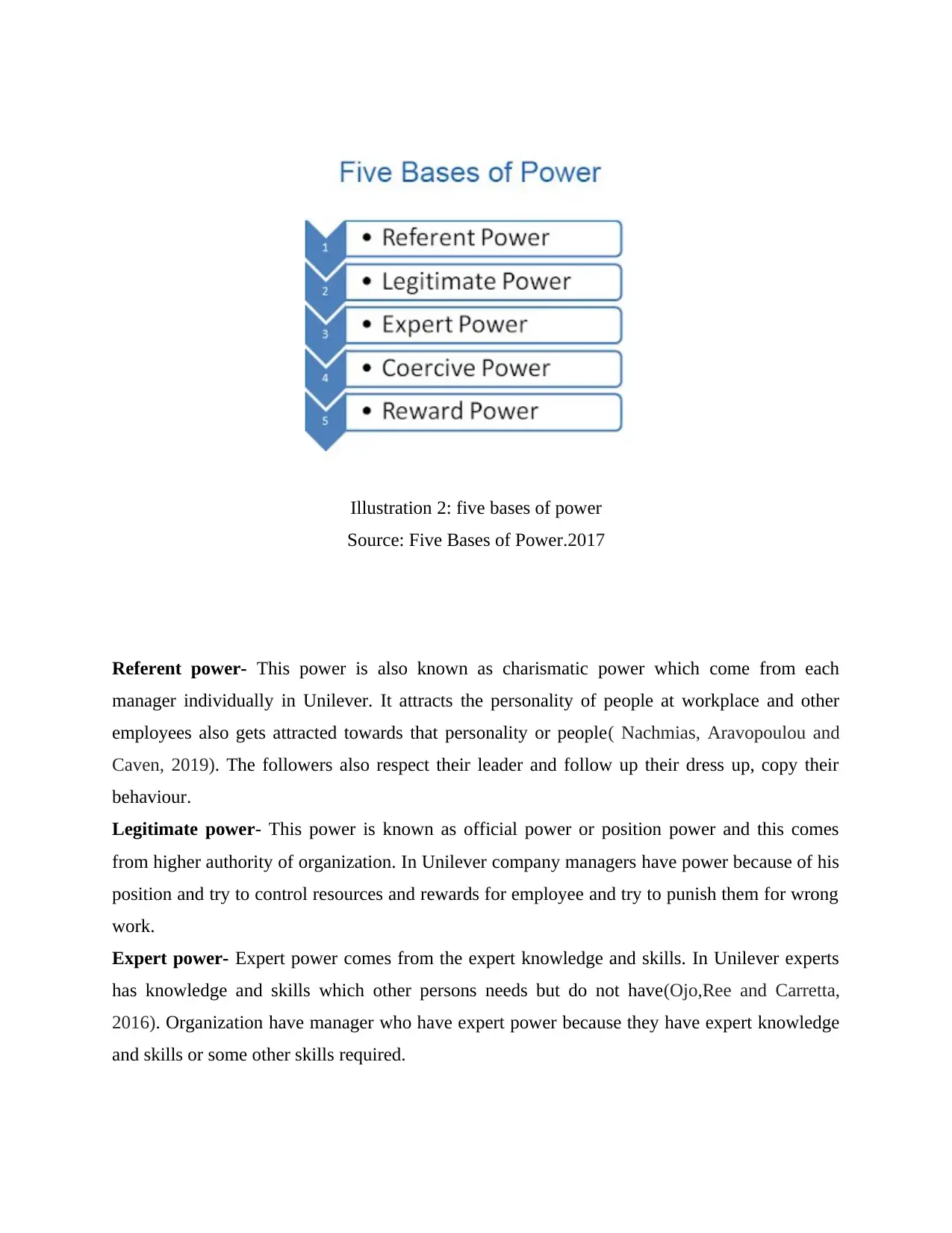
Referent power- This power is also known as charismatic power which come from each
manager individually in Unilever. It attracts the personality of people at workplace and other
employees also gets attracted towards that personality or people( Nachmias, Aravopoulou and
Caven, 2019). The followers also respect their leader and follow up their dress up, copy their
behaviour.
Legitimate power- This power is known as official power or position power and this comes
from higher authority of organization. In Unilever company managers have power because of his
position and try to control resources and rewards for employee and try to punish them for wrong
work.
Expert power- Expert power comes from the expert knowledge and skills. In Unilever experts
has knowledge and skills which other persons needs but do not have(Ojo,Ree and Carretta,
2016). Organization have manager who have expert power because they have expert knowledge
and skills or some other skills required.
Illustration 2: five bases of power
Source: Five Bases of Power.2017
manager individually in Unilever. It attracts the personality of people at workplace and other
employees also gets attracted towards that personality or people( Nachmias, Aravopoulou and
Caven, 2019). The followers also respect their leader and follow up their dress up, copy their
behaviour.
Legitimate power- This power is known as official power or position power and this comes
from higher authority of organization. In Unilever company managers have power because of his
position and try to control resources and rewards for employee and try to punish them for wrong
work.
Expert power- Expert power comes from the expert knowledge and skills. In Unilever experts
has knowledge and skills which other persons needs but do not have(Ojo,Ree and Carretta,
2016). Organization have manager who have expert power because they have expert knowledge
and skills or some other skills required.
Illustration 2: five bases of power
Source: Five Bases of Power.2017
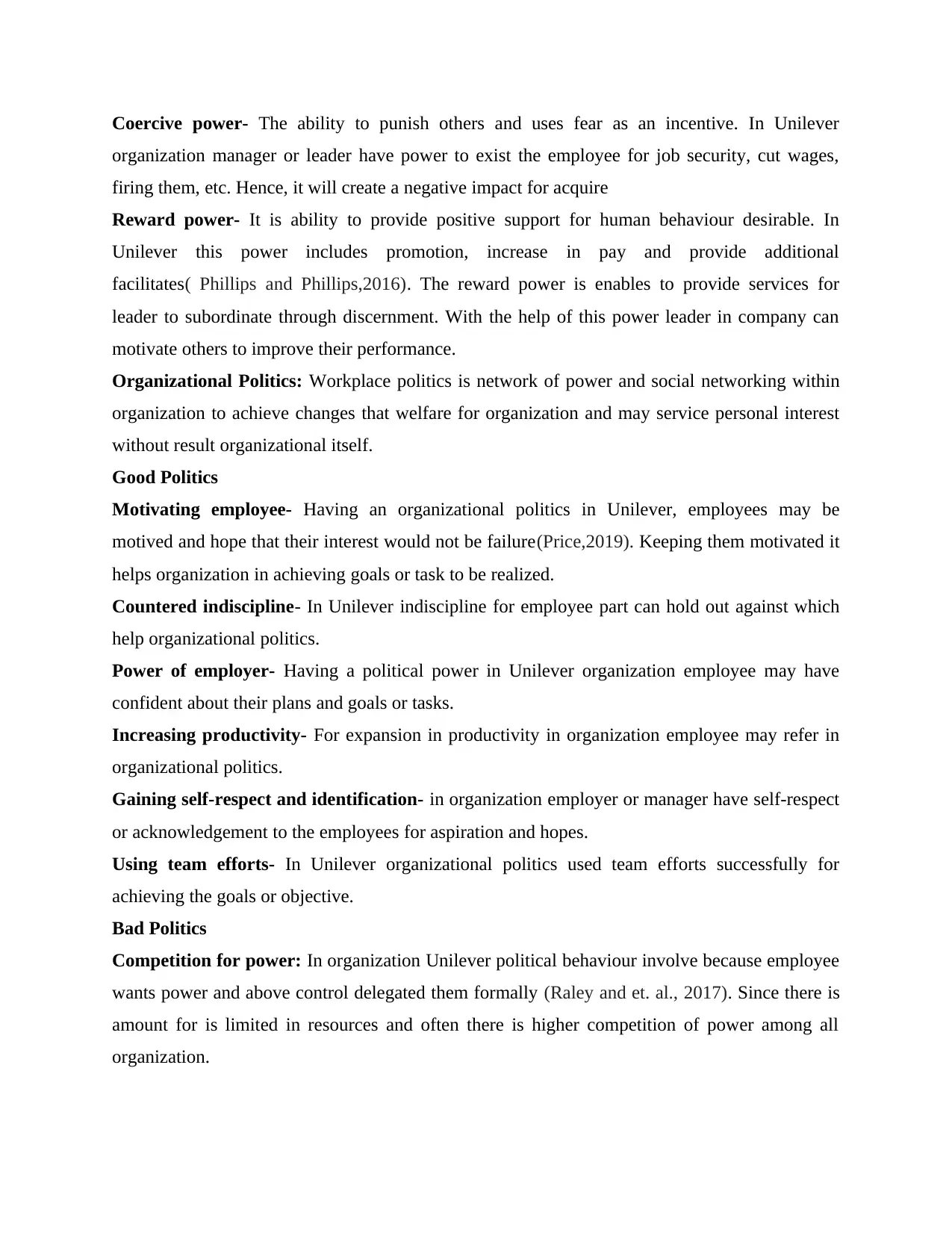
Coercive power- The ability to punish others and uses fear as an incentive. In Unilever
organization manager or leader have power to exist the employee for job security, cut wages,
firing them, etc. Hence, it will create a negative impact for acquire
Reward power- It is ability to provide positive support for human behaviour desirable. In
Unilever this power includes promotion, increase in pay and provide additional
facilitates( Phillips and Phillips,2016). The reward power is enables to provide services for
leader to subordinate through discernment. With the help of this power leader in company can
motivate others to improve their performance.
Organizational Politics: Workplace politics is network of power and social networking within
organization to achieve changes that welfare for organization and may service personal interest
without result organizational itself.
Good Politics
Motivating employee- Having an organizational politics in Unilever, employees may be
motived and hope that their interest would not be failure(Price,2019). Keeping them motivated it
helps organization in achieving goals or task to be realized.
Countered indiscipline- In Unilever indiscipline for employee part can hold out against which
help organizational politics.
Power of employer- Having a political power in Unilever organization employee may have
confident about their plans and goals or tasks.
Increasing productivity- For expansion in productivity in organization employee may refer in
organizational politics.
Gaining self-respect and identification- in organization employer or manager have self-respect
or acknowledgement to the employees for aspiration and hopes.
Using team efforts- In Unilever organizational politics used team efforts successfully for
achieving the goals or objective.
Bad Politics
Competition for power: In organization Unilever political behaviour involve because employee
wants power and above control delegated them formally (Raley and et. al., 2017). Since there is
amount for is limited in resources and often there is higher competition of power among all
organization.
organization manager or leader have power to exist the employee for job security, cut wages,
firing them, etc. Hence, it will create a negative impact for acquire
Reward power- It is ability to provide positive support for human behaviour desirable. In
Unilever this power includes promotion, increase in pay and provide additional
facilitates( Phillips and Phillips,2016). The reward power is enables to provide services for
leader to subordinate through discernment. With the help of this power leader in company can
motivate others to improve their performance.
Organizational Politics: Workplace politics is network of power and social networking within
organization to achieve changes that welfare for organization and may service personal interest
without result organizational itself.
Good Politics
Motivating employee- Having an organizational politics in Unilever, employees may be
motived and hope that their interest would not be failure(Price,2019). Keeping them motivated it
helps organization in achieving goals or task to be realized.
Countered indiscipline- In Unilever indiscipline for employee part can hold out against which
help organizational politics.
Power of employer- Having a political power in Unilever organization employee may have
confident about their plans and goals or tasks.
Increasing productivity- For expansion in productivity in organization employee may refer in
organizational politics.
Gaining self-respect and identification- in organization employer or manager have self-respect
or acknowledgement to the employees for aspiration and hopes.
Using team efforts- In Unilever organizational politics used team efforts successfully for
achieving the goals or objective.
Bad Politics
Competition for power: In organization Unilever political behaviour involve because employee
wants power and above control delegated them formally (Raley and et. al., 2017). Since there is
amount for is limited in resources and often there is higher competition of power among all
organization.
⊘ This is a preview!⊘
Do you want full access?
Subscribe today to unlock all pages.

Trusted by 1+ million students worldwide
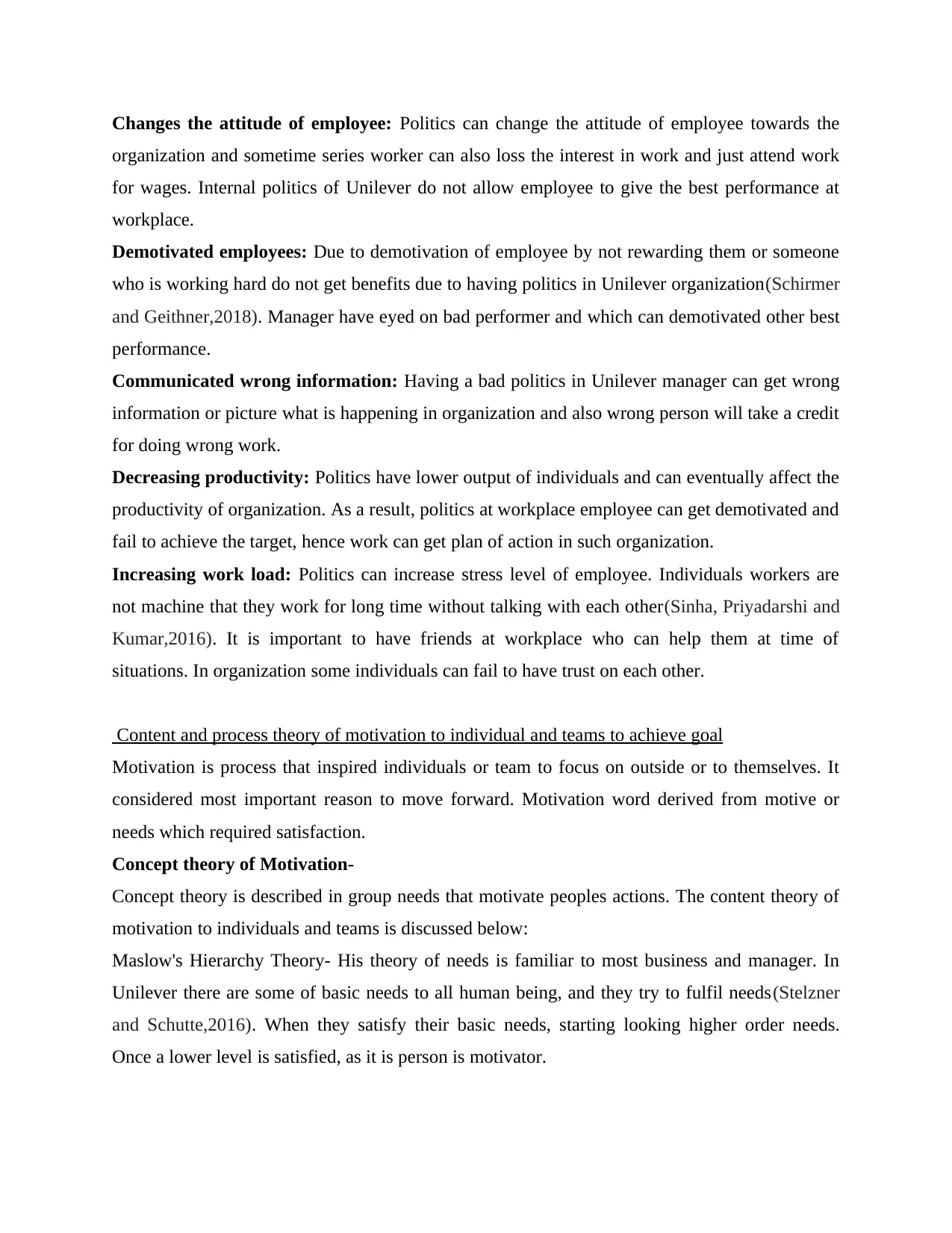
Changes the attitude of employee: Politics can change the attitude of employee towards the
organization and sometime series worker can also loss the interest in work and just attend work
for wages. Internal politics of Unilever do not allow employee to give the best performance at
workplace.
Demotivated employees: Due to demotivation of employee by not rewarding them or someone
who is working hard do not get benefits due to having politics in Unilever organization(Schirmer
and Geithner,2018). Manager have eyed on bad performer and which can demotivated other best
performance.
Communicated wrong information: Having a bad politics in Unilever manager can get wrong
information or picture what is happening in organization and also wrong person will take a credit
for doing wrong work.
Decreasing productivity: Politics have lower output of individuals and can eventually affect the
productivity of organization. As a result, politics at workplace employee can get demotivated and
fail to achieve the target, hence work can get plan of action in such organization.
Increasing work load: Politics can increase stress level of employee. Individuals workers are
not machine that they work for long time without talking with each other(Sinha, Priyadarshi and
Kumar,2016). It is important to have friends at workplace who can help them at time of
situations. In organization some individuals can fail to have trust on each other.
Content and process theory of motivation to individual and teams to achieve goal
Motivation is process that inspired individuals or team to focus on outside or to themselves. It
considered most important reason to move forward. Motivation word derived from motive or
needs which required satisfaction.
Concept theory of Motivation-
Concept theory is described in group needs that motivate peoples actions. The content theory of
motivation to individuals and teams is discussed below:
Maslow's Hierarchy Theory- His theory of needs is familiar to most business and manager. In
Unilever there are some of basic needs to all human being, and they try to fulfil needs(Stelzner
and Schutte,2016). When they satisfy their basic needs, starting looking higher order needs.
Once a lower level is satisfied, as it is person is motivator.
organization and sometime series worker can also loss the interest in work and just attend work
for wages. Internal politics of Unilever do not allow employee to give the best performance at
workplace.
Demotivated employees: Due to demotivation of employee by not rewarding them or someone
who is working hard do not get benefits due to having politics in Unilever organization(Schirmer
and Geithner,2018). Manager have eyed on bad performer and which can demotivated other best
performance.
Communicated wrong information: Having a bad politics in Unilever manager can get wrong
information or picture what is happening in organization and also wrong person will take a credit
for doing wrong work.
Decreasing productivity: Politics have lower output of individuals and can eventually affect the
productivity of organization. As a result, politics at workplace employee can get demotivated and
fail to achieve the target, hence work can get plan of action in such organization.
Increasing work load: Politics can increase stress level of employee. Individuals workers are
not machine that they work for long time without talking with each other(Sinha, Priyadarshi and
Kumar,2016). It is important to have friends at workplace who can help them at time of
situations. In organization some individuals can fail to have trust on each other.
Content and process theory of motivation to individual and teams to achieve goal
Motivation is process that inspired individuals or team to focus on outside or to themselves. It
considered most important reason to move forward. Motivation word derived from motive or
needs which required satisfaction.
Concept theory of Motivation-
Concept theory is described in group needs that motivate peoples actions. The content theory of
motivation to individuals and teams is discussed below:
Maslow's Hierarchy Theory- His theory of needs is familiar to most business and manager. In
Unilever there are some of basic needs to all human being, and they try to fulfil needs(Stelzner
and Schutte,2016). When they satisfy their basic needs, starting looking higher order needs.
Once a lower level is satisfied, as it is person is motivator.
Paraphrase This Document
Need a fresh take? Get an instant paraphrase of this document with our AI Paraphraser
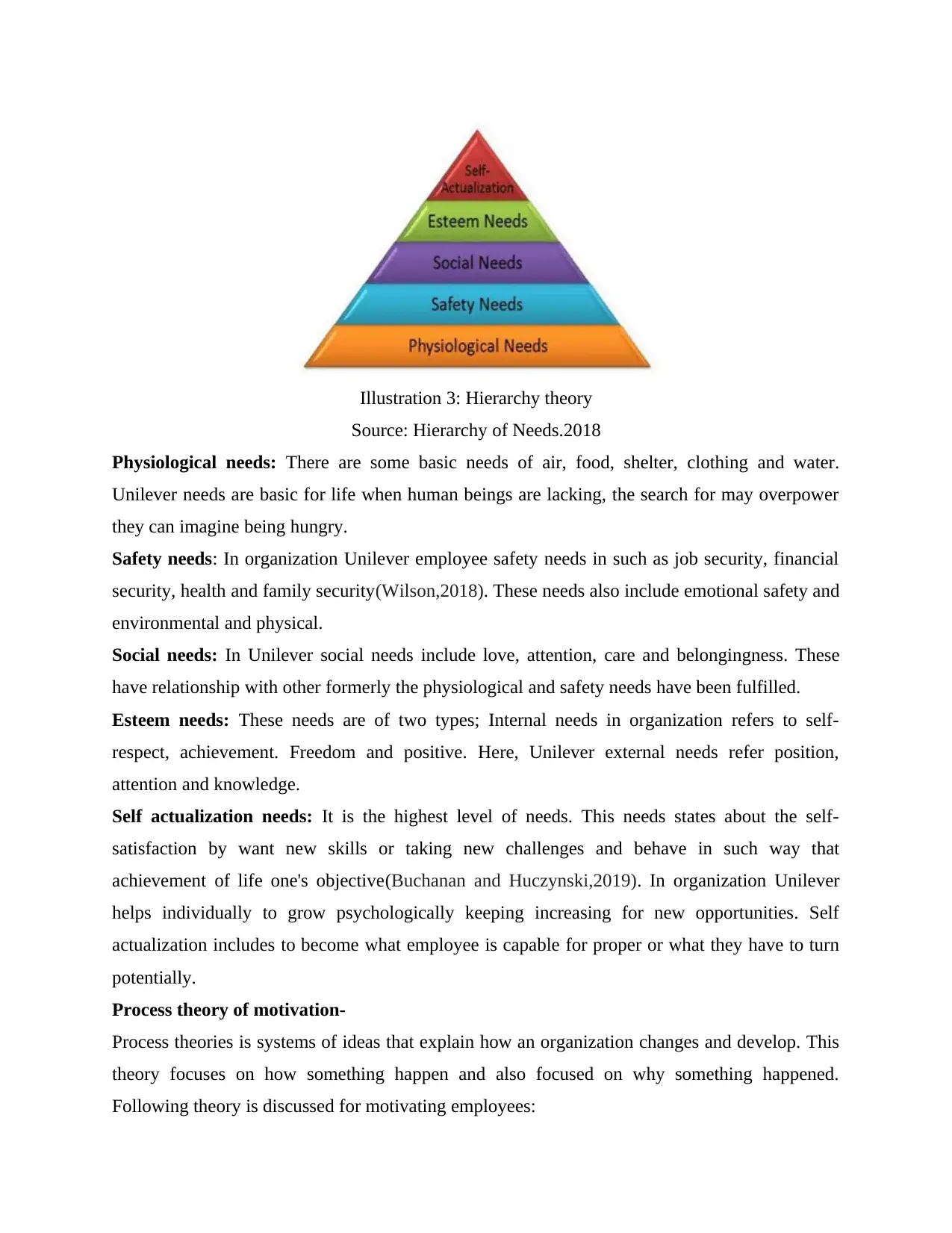
Physiological needs: There are some basic needs of air, food, shelter, clothing and water.
Unilever needs are basic for life when human beings are lacking, the search for may overpower
they can imagine being hungry.
Safety needs: In organization Unilever employee safety needs in such as job security, financial
security, health and family security(Wilson,2018). These needs also include emotional safety and
environmental and physical.
Social needs: In Unilever social needs include love, attention, care and belongingness. These
have relationship with other formerly the physiological and safety needs have been fulfilled.
Esteem needs: These needs are of two types; Internal needs in organization refers to self-
respect, achievement. Freedom and positive. Here, Unilever external needs refer position,
attention and knowledge.
Self actualization needs: It is the highest level of needs. This needs states about the self-
satisfaction by want new skills or taking new challenges and behave in such way that
achievement of life one's objective(Buchanan and Huczynski,2019). In organization Unilever
helps individually to grow psychologically keeping increasing for new opportunities. Self
actualization includes to become what employee is capable for proper or what they have to turn
potentially.
Process theory of motivation-
Process theories is systems of ideas that explain how an organization changes and develop. This
theory focuses on how something happen and also focused on why something happened.
Following theory is discussed for motivating employees:
Illustration 3: Hierarchy theory
Source: Hierarchy of Needs.2018
Unilever needs are basic for life when human beings are lacking, the search for may overpower
they can imagine being hungry.
Safety needs: In organization Unilever employee safety needs in such as job security, financial
security, health and family security(Wilson,2018). These needs also include emotional safety and
environmental and physical.
Social needs: In Unilever social needs include love, attention, care and belongingness. These
have relationship with other formerly the physiological and safety needs have been fulfilled.
Esteem needs: These needs are of two types; Internal needs in organization refers to self-
respect, achievement. Freedom and positive. Here, Unilever external needs refer position,
attention and knowledge.
Self actualization needs: It is the highest level of needs. This needs states about the self-
satisfaction by want new skills or taking new challenges and behave in such way that
achievement of life one's objective(Buchanan and Huczynski,2019). In organization Unilever
helps individually to grow psychologically keeping increasing for new opportunities. Self
actualization includes to become what employee is capable for proper or what they have to turn
potentially.
Process theory of motivation-
Process theories is systems of ideas that explain how an organization changes and develop. This
theory focuses on how something happen and also focused on why something happened.
Following theory is discussed for motivating employees:
Illustration 3: Hierarchy theory
Source: Hierarchy of Needs.2018
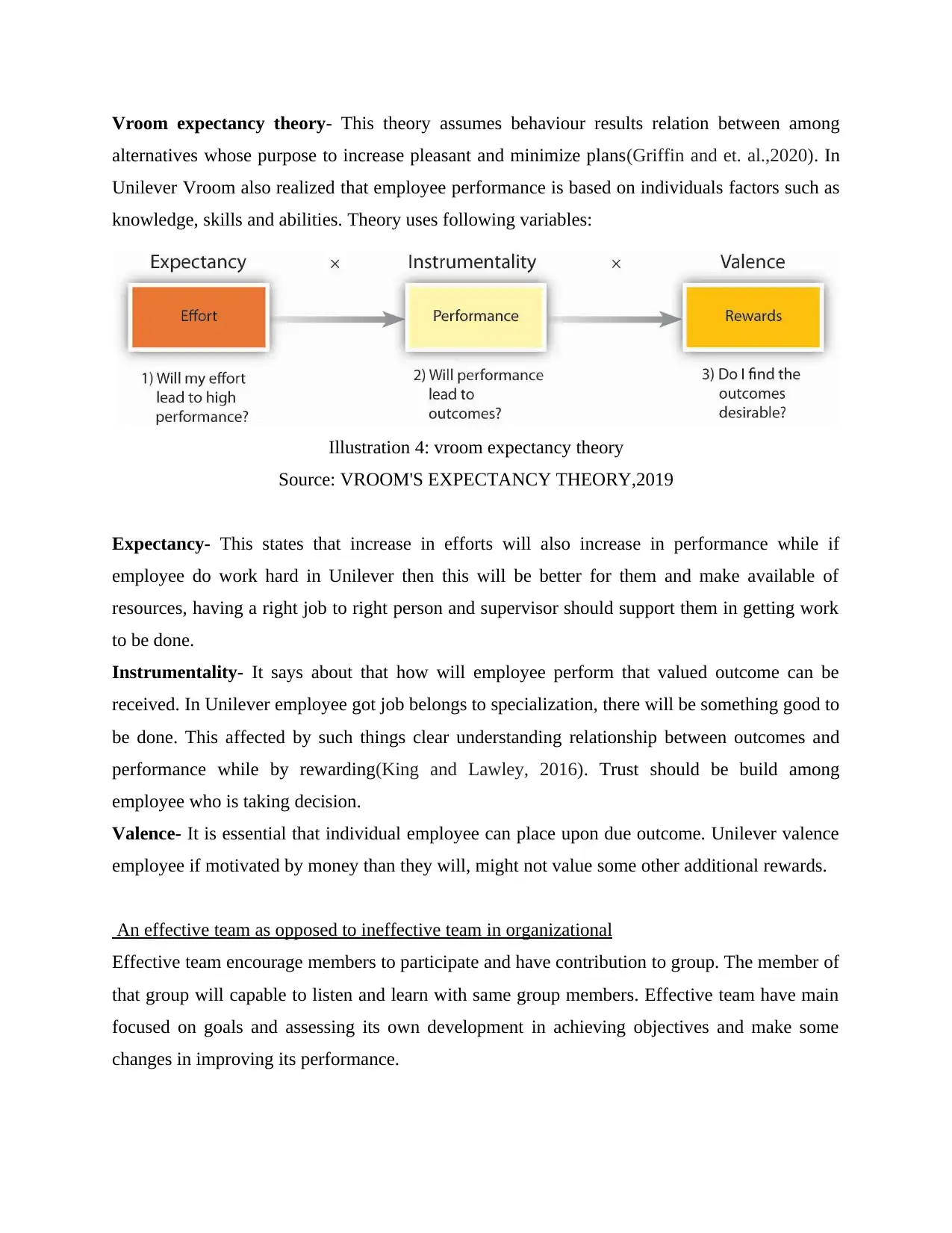
Vroom expectancy theory- This theory assumes behaviour results relation between among
alternatives whose purpose to increase pleasant and minimize plans(Griffin and et. al.,2020). In
Unilever Vroom also realized that employee performance is based on individuals factors such as
knowledge, skills and abilities. Theory uses following variables:
Expectancy- This states that increase in efforts will also increase in performance while if
employee do work hard in Unilever then this will be better for them and make available of
resources, having a right job to right person and supervisor should support them in getting work
to be done.
Instrumentality- It says about that how will employee perform that valued outcome can be
received. In Unilever employee got job belongs to specialization, there will be something good to
be done. This affected by such things clear understanding relationship between outcomes and
performance while by rewarding(King and Lawley, 2016). Trust should be build among
employee who is taking decision.
Valence- It is essential that individual employee can place upon due outcome. Unilever valence
employee if motivated by money than they will, might not value some other additional rewards.
An effective team as opposed to ineffective team in organizational
Effective team encourage members to participate and have contribution to group. The member of
that group will capable to listen and learn with same group members. Effective team have main
focused on goals and assessing its own development in achieving objectives and make some
changes in improving its performance.
Illustration 4: vroom expectancy theory
Source: VROOM'S EXPECTANCY THEORY,2019
alternatives whose purpose to increase pleasant and minimize plans(Griffin and et. al.,2020). In
Unilever Vroom also realized that employee performance is based on individuals factors such as
knowledge, skills and abilities. Theory uses following variables:
Expectancy- This states that increase in efforts will also increase in performance while if
employee do work hard in Unilever then this will be better for them and make available of
resources, having a right job to right person and supervisor should support them in getting work
to be done.
Instrumentality- It says about that how will employee perform that valued outcome can be
received. In Unilever employee got job belongs to specialization, there will be something good to
be done. This affected by such things clear understanding relationship between outcomes and
performance while by rewarding(King and Lawley, 2016). Trust should be build among
employee who is taking decision.
Valence- It is essential that individual employee can place upon due outcome. Unilever valence
employee if motivated by money than they will, might not value some other additional rewards.
An effective team as opposed to ineffective team in organizational
Effective team encourage members to participate and have contribution to group. The member of
that group will capable to listen and learn with same group members. Effective team have main
focused on goals and assessing its own development in achieving objectives and make some
changes in improving its performance.
Illustration 4: vroom expectancy theory
Source: VROOM'S EXPECTANCY THEORY,2019
⊘ This is a preview!⊘
Do you want full access?
Subscribe today to unlock all pages.

Trusted by 1+ million students worldwide
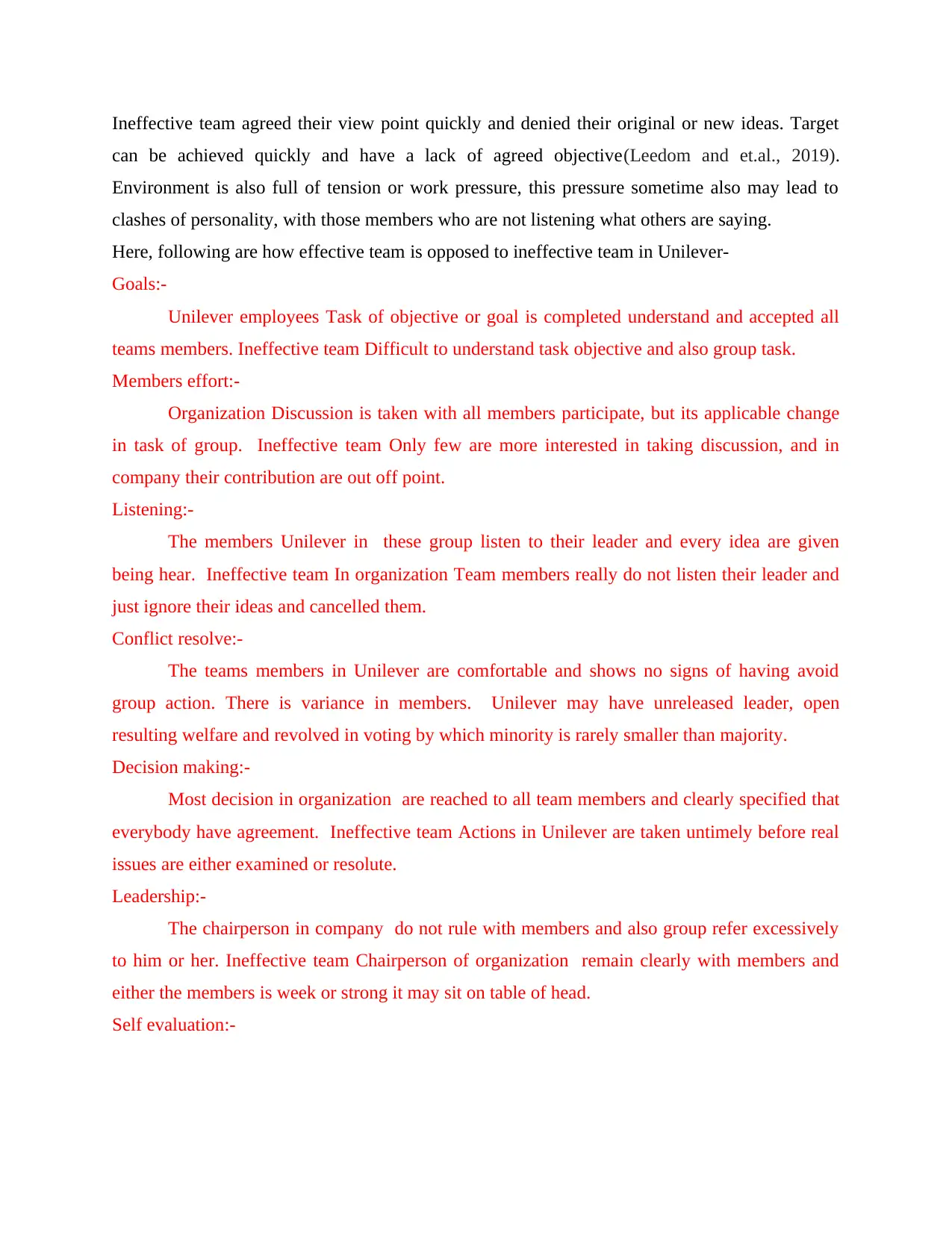
Ineffective team agreed their view point quickly and denied their original or new ideas. Target
can be achieved quickly and have a lack of agreed objective(Leedom and et.al., 2019).
Environment is also full of tension or work pressure, this pressure sometime also may lead to
clashes of personality, with those members who are not listening what others are saying.
Here, following are how effective team is opposed to ineffective team in Unilever-
Goals:-
Unilever employees Task of objective or goal is completed understand and accepted all
teams members. Ineffective team Difficult to understand task objective and also group task.
Members effort:-
Organization Discussion is taken with all members participate, but its applicable change
in task of group. Ineffective team Only few are more interested in taking discussion, and in
company their contribution are out off point.
Listening:-
The members Unilever in these group listen to their leader and every idea are given
being hear. Ineffective team In organization Team members really do not listen their leader and
just ignore their ideas and cancelled them.
Conflict resolve:-
The teams members in Unilever are comfortable and shows no signs of having avoid
group action. There is variance in members. Unilever may have unreleased leader, open
resulting welfare and revolved in voting by which minority is rarely smaller than majority.
Decision making:-
Most decision in organization are reached to all team members and clearly specified that
everybody have agreement. Ineffective team Actions in Unilever are taken untimely before real
issues are either examined or resolute.
Leadership:-
The chairperson in company do not rule with members and also group refer excessively
to him or her. Ineffective team Chairperson of organization remain clearly with members and
either the members is week or strong it may sit on table of head.
Self evaluation:-
can be achieved quickly and have a lack of agreed objective(Leedom and et.al., 2019).
Environment is also full of tension or work pressure, this pressure sometime also may lead to
clashes of personality, with those members who are not listening what others are saying.
Here, following are how effective team is opposed to ineffective team in Unilever-
Goals:-
Unilever employees Task of objective or goal is completed understand and accepted all
teams members. Ineffective team Difficult to understand task objective and also group task.
Members effort:-
Organization Discussion is taken with all members participate, but its applicable change
in task of group. Ineffective team Only few are more interested in taking discussion, and in
company their contribution are out off point.
Listening:-
The members Unilever in these group listen to their leader and every idea are given
being hear. Ineffective team In organization Team members really do not listen their leader and
just ignore their ideas and cancelled them.
Conflict resolve:-
The teams members in Unilever are comfortable and shows no signs of having avoid
group action. There is variance in members. Unilever may have unreleased leader, open
resulting welfare and revolved in voting by which minority is rarely smaller than majority.
Decision making:-
Most decision in organization are reached to all team members and clearly specified that
everybody have agreement. Ineffective team Actions in Unilever are taken untimely before real
issues are either examined or resolute.
Leadership:-
The chairperson in company do not rule with members and also group refer excessively
to him or her. Ineffective team Chairperson of organization remain clearly with members and
either the members is week or strong it may sit on table of head.
Self evaluation:-
Paraphrase This Document
Need a fresh take? Get an instant paraphrase of this document with our AI Paraphraser
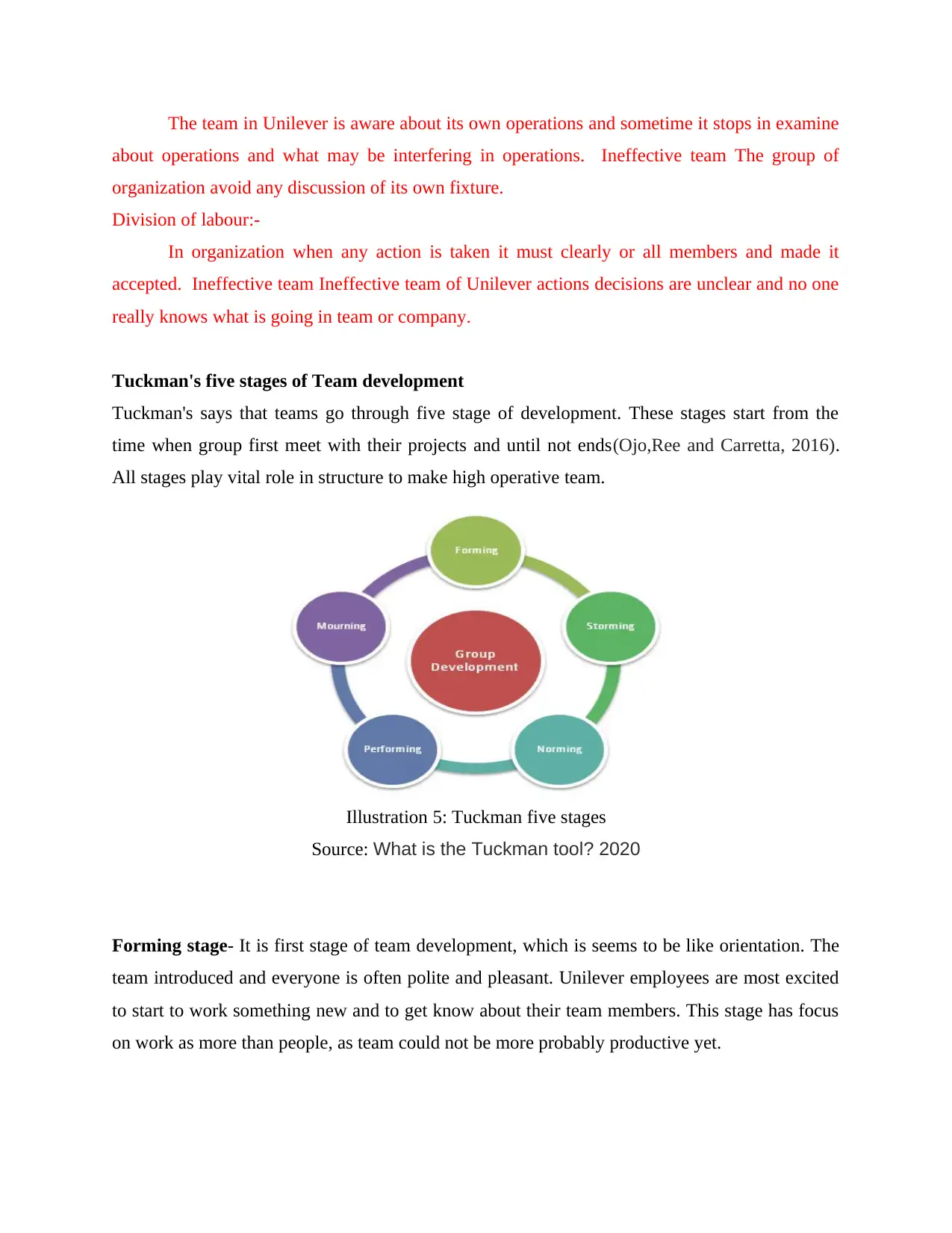
The team in Unilever is aware about its own operations and sometime it stops in examine
about operations and what may be interfering in operations. Ineffective team The group of
organization avoid any discussion of its own fixture.
Division of labour:-
In organization when any action is taken it must clearly or all members and made it
accepted. Ineffective team Ineffective team of Unilever actions decisions are unclear and no one
really knows what is going in team or company.
Tuckman's five stages of Team development
Tuckman's says that teams go through five stage of development. These stages start from the
time when group first meet with their projects and until not ends(Ojo,Ree and Carretta, 2016).
All stages play vital role in structure to make high operative team.
Forming stage- It is first stage of team development, which is seems to be like orientation. The
team introduced and everyone is often polite and pleasant. Unilever employees are most excited
to start to work something new and to get know about their team members. This stage has focus
on work as more than people, as team could not be more probably productive yet.
Illustration 5: Tuckman five stages
Source: What is the Tuckman tool? 2020
about operations and what may be interfering in operations. Ineffective team The group of
organization avoid any discussion of its own fixture.
Division of labour:-
In organization when any action is taken it must clearly or all members and made it
accepted. Ineffective team Ineffective team of Unilever actions decisions are unclear and no one
really knows what is going in team or company.
Tuckman's five stages of Team development
Tuckman's says that teams go through five stage of development. These stages start from the
time when group first meet with their projects and until not ends(Ojo,Ree and Carretta, 2016).
All stages play vital role in structure to make high operative team.
Forming stage- It is first stage of team development, which is seems to be like orientation. The
team introduced and everyone is often polite and pleasant. Unilever employees are most excited
to start to work something new and to get know about their team members. This stage has focus
on work as more than people, as team could not be more probably productive yet.
Illustration 5: Tuckman five stages
Source: What is the Tuckman tool? 2020
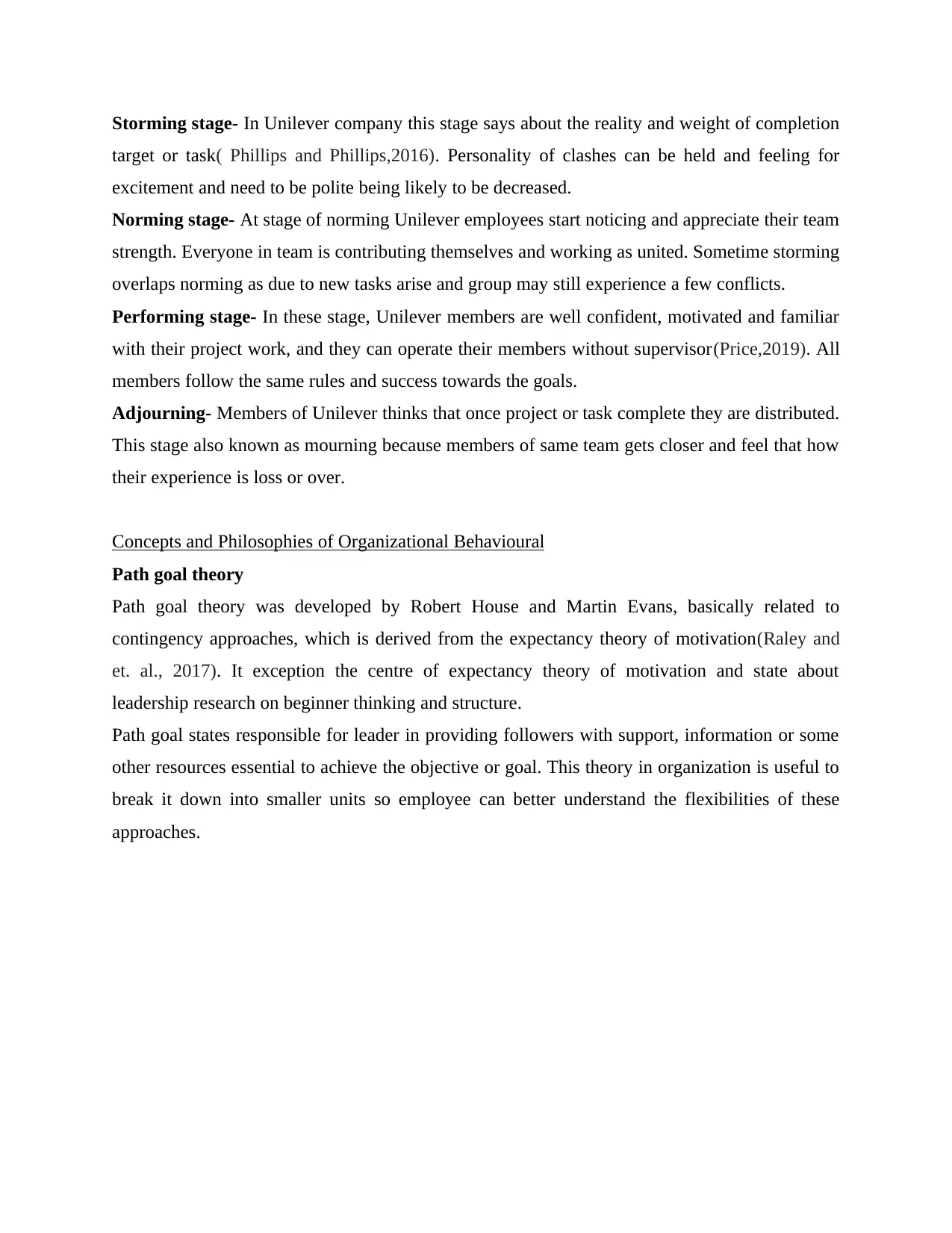
Storming stage- In Unilever company this stage says about the reality and weight of completion
target or task( Phillips and Phillips,2016). Personality of clashes can be held and feeling for
excitement and need to be polite being likely to be decreased.
Norming stage- At stage of norming Unilever employees start noticing and appreciate their team
strength. Everyone in team is contributing themselves and working as united. Sometime storming
overlaps norming as due to new tasks arise and group may still experience a few conflicts.
Performing stage- In these stage, Unilever members are well confident, motivated and familiar
with their project work, and they can operate their members without supervisor(Price,2019). All
members follow the same rules and success towards the goals.
Adjourning- Members of Unilever thinks that once project or task complete they are distributed.
This stage also known as mourning because members of same team gets closer and feel that how
their experience is loss or over.
Concepts and Philosophies of Organizational Behavioural
Path goal theory
Path goal theory was developed by Robert House and Martin Evans, basically related to
contingency approaches, which is derived from the expectancy theory of motivation(Raley and
et. al., 2017). It exception the centre of expectancy theory of motivation and state about
leadership research on beginner thinking and structure.
Path goal states responsible for leader in providing followers with support, information or some
other resources essential to achieve the objective or goal. This theory in organization is useful to
break it down into smaller units so employee can better understand the flexibilities of these
approaches.
target or task( Phillips and Phillips,2016). Personality of clashes can be held and feeling for
excitement and need to be polite being likely to be decreased.
Norming stage- At stage of norming Unilever employees start noticing and appreciate their team
strength. Everyone in team is contributing themselves and working as united. Sometime storming
overlaps norming as due to new tasks arise and group may still experience a few conflicts.
Performing stage- In these stage, Unilever members are well confident, motivated and familiar
with their project work, and they can operate their members without supervisor(Price,2019). All
members follow the same rules and success towards the goals.
Adjourning- Members of Unilever thinks that once project or task complete they are distributed.
This stage also known as mourning because members of same team gets closer and feel that how
their experience is loss or over.
Concepts and Philosophies of Organizational Behavioural
Path goal theory
Path goal theory was developed by Robert House and Martin Evans, basically related to
contingency approaches, which is derived from the expectancy theory of motivation(Raley and
et. al., 2017). It exception the centre of expectancy theory of motivation and state about
leadership research on beginner thinking and structure.
Path goal states responsible for leader in providing followers with support, information or some
other resources essential to achieve the objective or goal. This theory in organization is useful to
break it down into smaller units so employee can better understand the flexibilities of these
approaches.
⊘ This is a preview!⊘
Do you want full access?
Subscribe today to unlock all pages.

Trusted by 1+ million students worldwide
1 out of 17
Related Documents
Your All-in-One AI-Powered Toolkit for Academic Success.
+13062052269
info@desklib.com
Available 24*7 on WhatsApp / Email
![[object Object]](/_next/static/media/star-bottom.7253800d.svg)
Unlock your academic potential
Copyright © 2020–2026 A2Z Services. All Rights Reserved. Developed and managed by ZUCOL.




